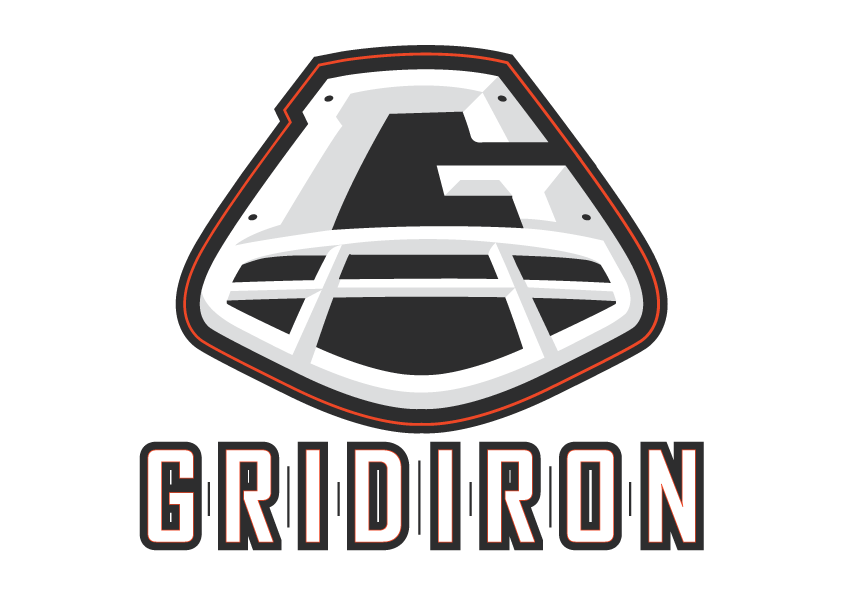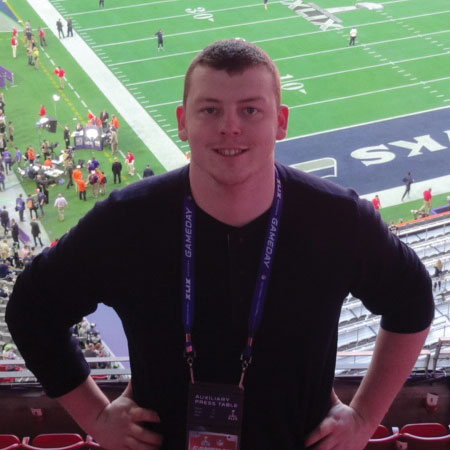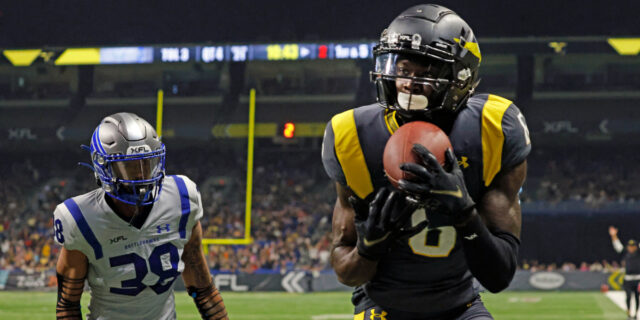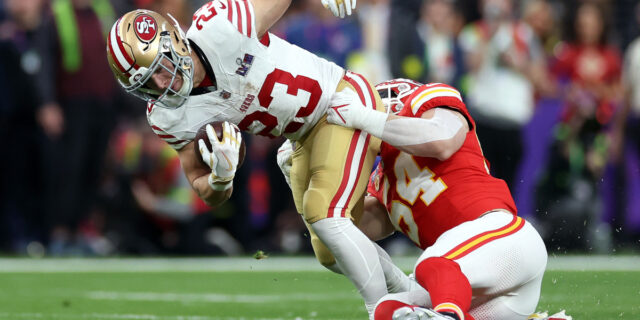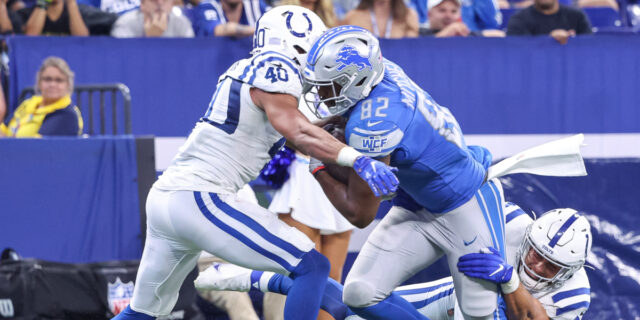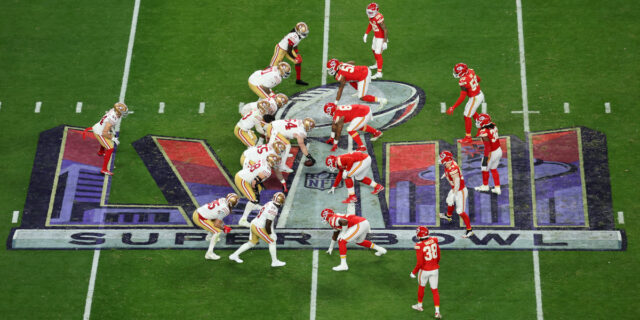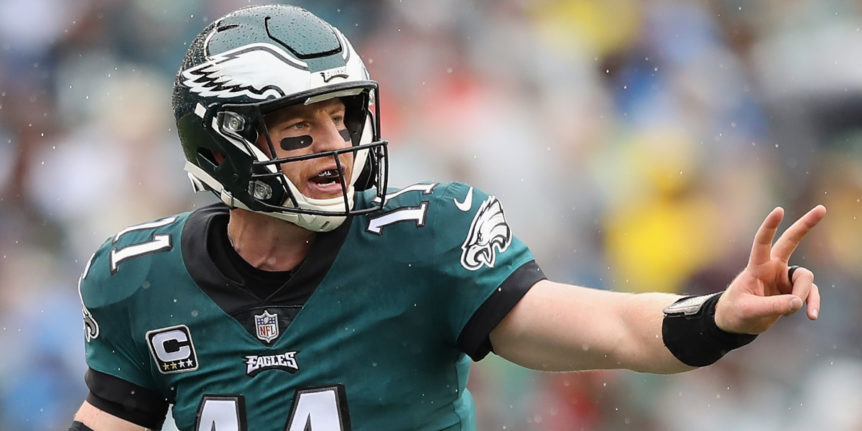
Dethroned?
This article originally appeared in Issue XXII of Gridiron magazine – for individual editions or subscriptions, click HERE
The entourage tells its own story. Only Rob Gronkowski, with Papa Gronk acting as fullback up front and agent Drew Rosenhaus in behind him alongside an array of others, boasts a greater group of hangers-on as he storms around interview tables at Radio Row on Super Bowl Week. That such an army encircles the New England Patriots tight end becomes somewhat understandable when the fans hovering behind the lines begin to swarm as his unmistakable frame comes into view. But Brand Paxton Lynch has yet to hit the heights of Brand Gronk just yet, a fact illustrated by a supporter ushering me over and asking ‘Who’s that guy with all the people around him?’ ahead of our interview.
The supporting cast might seem out of kilter, but it’s revealing. While Lynch stands out among the crowd – the 6ft 7ins frame that has draft experts salivating propels him above most in the room – the man who might dictate whether he is the first quarterback to hear his name called on April 28 pales into insignificance. The sleight figure of super agent Leigh Steinberg is the reason Lynch is here, undertaking a well-worn process that sees one of the world’s best conductors get the orchestra playing his tune. Lynch is shepherded everywhere from ESPN to Gridiron, all with one aim: putting his name in the spotlight on the NFL’s biggest week.
“We’re trying to raise his profile,” reveals Steinberg. “We bring him here to show him what goes around football. Then we have our party later in the week that has general managers and owners present so Paxton can meet people. There will be all sorts of folks that he will meet. It’s just a case of training and preparing him.”
Although schmoozing the media will not determine what NFL general managers decide in May, it helps. The day after our chat, Gridiron spots Lynch again, this time centre stage at Steinberg’s yearly Super Bowl party. Among the illustrious guests is new Cleveland Browns head coach Hue Jackson, one of the men in control of the highest pick among the NFL’s quarterback-needy teams.
In the business they call it ‘networking’ and when the Super Bowl’s media frenzy ends it feels like Lynch, having attacked his interviews with the polish of a presidential candidate not named Trump, has enhanced his hopes of glory in May. Throughout the week, his rivals for draft recognition – North Dakota State’s Carson Wentz and Cal’s Jared Goff – are nowhere to be seen.
““As soon as you draft a quarterback in the first round, the clock starts ticking — and it’s ticking fast. You’re saying, ‘This is our franchise’. If that doesn’t work out, it’s hard to survive that.”
Steinberg’s man making a good impression three months before the draft is just part of the story, for he had merely cleared the first hurdle of a mammoth race with hurdles completely unique to a crazy track that ends in a jersey presentation from Roger Goodell at Chicago’s Auditorium Theatre.
The draft process has become big business. Teams employ roughly six regional scouts, a general manager and around five other personnel men, all to ensure they’re not left behind in pursuit of the best young players coming from college. It isn’t just the 32 franchises on this wild ride; every media enterprise from ESPN to Bleacher Report has at least one person whose year-round job is to scout players in college. Draft time is now just an extension of the season, a three-month circus that impacts everyone from players and agents to the merchandise staff tasked with stitching names on jerseys. “It’s changed tremendously,” former Tampa Bay Buccaneers general manager Mark Dominik tells Gridiron. “There is obviously a lot more coverage. The overall coverage is incredible. Even in the off-season, the NFL is a huge event.”
This period is most unusual for those at the centre of the gaze. If the majority of draft picks reach the new year having spent their lives overly coddled as high school superheroes and college icons, the ensuing weeks are grounding. Imagine it. Having every decision from why you had a fight in middle school to where you eat lunch scrutinised; being herded into Indianapolis’ Lucas Oil Stadium for public athletic tests and behind-closed-door prods by the hands of doctors; sitting across from teams and being asked questions like ‘How many different things can you think of that you can do with a paper clip?’. It’s where the NFL meets CSI, an intrusive and daunting process that sees potential draftees put firmly under the microscope.
“People would be surprised by how thorough it is, especially for guys who have a little bit of a character concern or have done something in their past,” adds Dominik. “We used to put together booklets of around 10 to 12 pages on people we were considering in the first round. I started that in 2010. For example, Gerald McCoy – who we drafted third overall – had no red flags, but we still went to his house and took pictures, visited his high school and had scouts put together a pamphlet about his full life. You spend so much time getting to know all these players and their character; it’s the second-most important thing you have to figure out besides how good players are.”
While there is everything to gain for players during this arduous few months, general managers have it all to lose. Make a good pick and you’ll get a pat on the back with the disclaimer that, ‘Hey, it’s your job’; make a bad one and you might not be making the decision again next year. “The scrutiny is crystal clear,” adds Dominik. “Nobody bats 100 and gets every pick right, but everybody let’s you know when you don’t do that. You’re doing everything you can to get the right guy, but you understand you’re judged immediately. People are putting out grades on who had the best draft before players have even played a down, and that scrutiny continues as the years go on. You just hope to draft the right guy, and even now when I work in the media, I am still rooting for the guys I drafted.”
Imagine taking that pressure, multiplying it by 1,000 and you have a rough indication of the continuous analysis facing decision-makers who select a quarterback in the opening round. “It’s totally amplified,” adds Dominik. “As soon as you draft a quarterback in the first round, the clock starts ticking – and it’s ticking fast. You’re saying, ‘This is our franchise’. If that doesn’t work out, it’s hard to survive that. There have been a few guys who’ve managed to do that – Rick Spielman in Minnesota is one, having taken Christian Ponder and then had another chance with Teddy Bridgewater – but it’s very rare.
“You usually get one shot to swing and if you miss, it’s a shame. But you have to take a swing. That’s the position in this league. If someone asks how you have success, the simple answer is to have one of those quarterbacks. You have to have to guts to pull the trigger.”
“I never had a quarterback coach growing up and I taught myself how to throw from baseball. What I’ve done has worked for me and gotten me to where I am now.”
“The closest comparison to the guys I’ve had is Ben Roethlisberger. He is 6ft 7ins, has a great release point and has hands that are almost 1ft long. He can throw on the run, escape the pocket and has great accuracy. He has the most upside of any of the quaterbacks; I think he’ll end up getting picked very high.”
By the time Steinberg’s soliloquy is over, vivid memories of Lynch’s harrowing final appearance for Memphis are fading. NFL evaluators, though, mustn’t be swayed by such declarations, even when they come from a man who’s represented a record eight first overall picks. Their job is to turn on the film and see prospects in the environment that matters most: on the field, in the heat of battle, where there is no PR sheen. And it’s what they see when flicking back to this year’s Birmingham Bowl that might ultimately determine where Lynch goes come May.
The Tigers entered the fixture on the crest of a wave. Led by a quarterback growing in stature, they could cap a wonderful season that featured nine wins, including an upset of SEC powerhouse Ole Miss, by overcoming another storied outfit, Auburn. Unfortunately, they left the field humiliated, pants to their ankles following a 31-10 shellacking. For Lynch, it was an inglorious exit, a game where he completed just 16-of-37 passes for 109 yards, no touchdowns and one interception.
“Everybody plays a bad game,” he tells Gridiron. “A lot of things were happening with our programme with Coach Fuente leaving and things like that. I am not one to point fingers and make excuses, though. They weren’t on the field and I played poor, but there are 12 other games where I played outstandingly. The knock has been that I struggled against a weak SEC defense but, if you look at the Ole Miss and Houston games, I think it speaks for itself. There are enough signature performances.”
Lynch is right. There are signature performances, against Bowling Green, Ole Miss and SMU. However, the reality lies somewhere between the Ole Miss game and that Auburn shocker. “He’s had big production in a lot of games, so-so in some others,” said one NFL scout.
The ugly performances, including that one against Auburn, speak to a man not ready for the big time. The upside is great, but the manner in which the Tigers befuddled Lynch by taking away the screens that were such a key to Memphis’ offense indicates he isn’t ready for a pro system yet. “I’ve been working on everything. You start from the bottom up so I’ve been putting a lot of work into my footwork. I never had a quarterback coach growing up and I taught myself how to throw from baseball. What I’ve done has worked for me and gotten me to where I am now, but I’m definitely working on lots of things to fine-tune what I do.”
“I would relish the opportunity to sit behind somebody and learn from them. It wouldn’t bother me at all.” He’ll need to be, for the one certainty is that Lynch is not ready to start day one. But that shouldn’t hurt his stock too much given there’s so much to like. He improved year-on-year in college, has Russell Wilson-like running ability and possesses the quintessential quarterback’s frame, complete with a good arm. Lynch isn’t short of confidence, either.
“Carson Wentz and Jared Goff are garnering a lot of attention, plus some other guys, but I don’t think you’ll find a quarterback as big and as athletic as me in this draft or the next one. I am a guy who can throw it around, but also scramble and make second and third chances happen as well.”
“Your concerns are adaptability. … But you can see a kid like this, how well he plays from the pocket, the mechanics and his footwork. You’re looking for the transferable skills.”
“This is Aaron Rodgers. This is the real deal.” For Texas defensive coordinator Vance Bedford, there’s no doubt. Jared Goff is a superstar ready to follow in the footsteps of idol Joe Montana. That may be overstating his case, yet there’s little doubt this number 16 will be selected higher than the man he grew up in the Bay Area worshipping.
If Lynch and Wentz are the horses coming up the rail on the inside, Goff is the frontrunner doing everything in his power to hold them off. Throughout the campaign, he was considered the best quarterback prospect available, an assumption that becomes understandable when you see some of his better moments for Cal. “He has what we call typewriter feet, where his feet are hot and they’re moving and he can work and find throwing lanes,” said Bears head coach James Franklin. “We want (quarterbacks) to look like Peyton Manning and he does.”
If the Rodgers and Manning comparisons are obvious hyperbole, at least the latter is somewhat understandable. Goff’s good arm is nothing compared to that possessed by Rodgers – arguably the best pure thrower in NFL history – but there is clear evidence he has the kind of smarts that turned Manning into a future Hall of Famer. Goff’s football IQ was best illustrated by Franklin giving him freedom to change routes and protections, or plays entirely, at the line of scrimmage – something the coach has never done with another signal-caller.
“Jared has improved from last year in terms of his poise in the pocket,” a scout told Gridiron. “He has a good release and a good arm up the seams. Your concerns are adaptability. … But you can see a kid like this, how well he plays from the pocket, the mechanics and his footwork. You’re looking for the transferable skills.” The aforementioned freedom afforded to Goff suggests such ‘transferrable skills’ are in place, which is all the more impressive given that he operated behind a dire offensive line at Cal.
For all the positives, there is a reason Goff isn’t a sure top-five pick. Like Lynch, his CV features a damaging display: a five-interception meltdown in the 30-24 loss to Utah. If that effort encourages scouts to look harder at the tape, what they will see is an inconsistent passer with accuracy issues; for every amazing dime thrown with defenders draped around him, there are examples of Goff missing wide-open receivers from a clean pocket.
Throw in his surprisingly small hands and concern he might be ‘too nice’ to lead an NFL team and you get a picture of what NFL men around the land are discussing. But is it nit-picking or are these legitimate concerns? “Andrew Luck is as nice as they come,” one college scouting director said, “and he’s still respected by his teammates. There are different kinds of leadership.”
“I’ve never been around anybody like him. He has that ability to lead and galvanise team-mates that you look for. I don’t think it’s an exaggeration to say that many of those who played with him would have been willing to die for him.”
“All we really knew is that he was the top athlete on North Dakota. He hadn’t played quarterback as a junior in high school due to tendonitis in his shoulder brought on by a growth spurt; if anything, he looked like a 6ft 5ins safety.” It’s fair to say offensive coordinator Tim Polasek didn’t know what to expect when North Dakota State recruited Carson Wentz. “We just decided he was the best option in the state and went out and got him,” adds Polasek to Gridiron.
If doubts existed over the course of that process, Wentz quickly set about destroying them. “From day one, we realised he had special arm talent, the It Factor and a competitiveness. I’ve never been around anybody like him. He has that ability to lead and galvanise team-mates that you look for. I don’t think it’s an exaggeration to say that many of those who played with Carson would have been willing to die for him.”
Listening to Polasek talk, you quickly begin to realise how Wentz has risen from mid-round option to likely top-10 pick.
To watch this previously-unheralded prospect fling the ball is a thing of beauty. He has all of the tools: a rocket-fuelled arm, accuracy, athleticism. The only knock is competition and sample size. Wentz played in the FCS, a level below the major colleges that produce most draft picks, and only featured in 23 games. Compare that with Goff, who boasts 35 outings in the Pac-12. “He’s the most physically talented quarterback of the group,” said one NFL scout. “Would I be nervous with this guy? Absolutely. But if you have no quarterback, what do you got to lose?”
Those factors initially looked set to resign Wentz to later rounds, and then the kid who hasn’t gotten less than an A at school (EVER!) set about allaying their concerns. He has killed every part of the process; Wentz was the best player at the Senior Bowl, had most the outstanding combine of any quarterback and backed it all up with a fine Pro Day. “This guy is so competitive,” adds Polasek. “If anything, I just think he’ll get better with every challenge. I just can’t see the kid getting discouraged. I told scouts what would happen at the Senior Bowl and combine. His expectations for himself are so high that he won’t allow himself to fail.”
Being a straight-A student may not seem important to a quarterback, but you better believe scouts are taking notice. That, plus his impressive score of 29 on the Wonderlic, speak to an intelligence that add to the package. A quick trip to the film room will persuade anybody that his footballing smarts match up, with Wentz looking at ease in North Dakota’s pro-style offense. “I think the system a huge advantage,” adds Polasek. “You see him get under centre, get through progressions and throw to his second, third or fourth read. He can handle a lot of offensive verbiage and we let him make checks at the line too. It’s funny because we kept putting things on his plate and we could just never reach the limit of his capabilities.”
Peyton Manning kept repeating that ‘timing was everything’ during his final press conference, and Wentz’s is looking pretty good. His ability to run at 6ft 5ins evokes images of Cam Newton and Andrew Luck. Not bad considering the former is coming off an MVP season. “He has extraordinary athleticism for a guy who’s 6ft 5ins,” reveals Polasek. “He reminds me of Ben Roethlisberger, so much so that we used to call him Big Ben. Most importantly, though, he’s Carson Wentz. There has never been doubt about his ability. He’s a super-talented guy who isn’t arrogant and raises everybody else’s level of play. He’s great in the two-minute drill and has that innate ability to forget bad plays. They don’t come around very often but, when he has them, he just goes back out there and goes again. That’s rare. Whoever drafts Carson Wentz won’t be disappointed.”
Size: Tick. Arm: Tick. Intelligence: Tick. Leadership: Tick. Clutch: Tick. The only question is whether a small-school kid can hack it in the big leagues. “He’s got an arm,” another scout said. “But it’s such a long way from that level of play to the NFL at any position, let alone quarterback.”
“You have to just make sure you feel good enough about the player. You can’t convince yourself he can do things which you don’t see.”
As the big day approaches, there is no consensus. Most in the media believe that Wentz and Goff are the best quarterbacks available, but dig deep enough and you’ll find supporters of Lynch. Perhaps such disagreement is even prevalent inside the teams praying thousands of report pages pay off, that they get chance to pick their guy, and that he becomes the next Tom Brady.
The commissioner may not have announced it yet, but the likes of the Cleveland Browns and San Francisco 49ers have actually been on the clock for weeks. From the moment the season ended, the countdown began. All the dollars put into promotional campaigns and training facilities for players, and the thousands of hours spent by personnel departments and private detectives vetting potential draftees, come down to one little slip of paper. Hand in the right name and you’re a hero, flush with lifelong job security and comfort for your family; hand in the wrong one and you might be holding a P45 in a few months’ time.
It’s a situation Dominik knows all too well. In Tampa, he staked his reputation and career on Josh Freeman from Kansas State with the 17th pick. “You have to just make sure you feel good enough about the player,” he suggests. “You can’t convince yourself he can do things which you don’t see.”
Dominik’s gamble on Freeman looked a masterstroke as the passer enjoyed a solid first four years, which crescendoed with a 4,000-yard campaign in 2012. Unfortunately, the decline was steep from that peak; Freeman regressed severely the following year and was cut loose by October. Come February, Dominik was also searching for a new job.
“Our coach Raheem Morris had just coached at K-State the year before and he knew Josh as well as anybody could,” he said. “It was hard not to fall in love with the physical traits. He had everything, a big body, athleticism, the arm. But you have to look at the character and make sure you are totally comfortable with everything. He faltered and his life off the field wasn’t able to hold up. Why that happened, I’m still not sure and I’ve looked back at it a lot.
“It’s difficult, though, because he wasn’t a Ryan Leaf; he was a good quarterback whose career didn’t pan out because he got distracted by things outside of football. But at the same time, do I think it’s right to take a quarterback if you need one? Yeah, you better pull the trigger.”
The question, this year more than ever, is who do you ‘pull the trigger’ on?
This article originally appeared in Issue XXII of Gridiron magazine – for individual editions or subscriptions, click HERE
